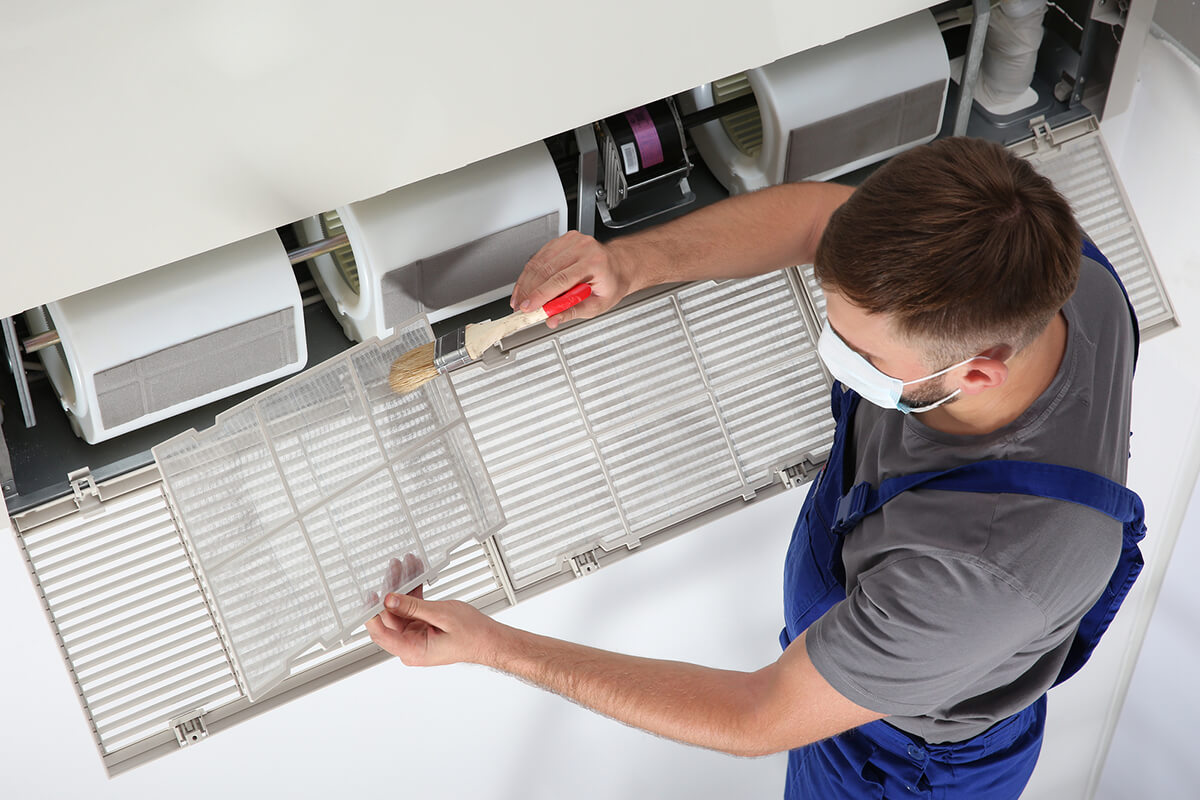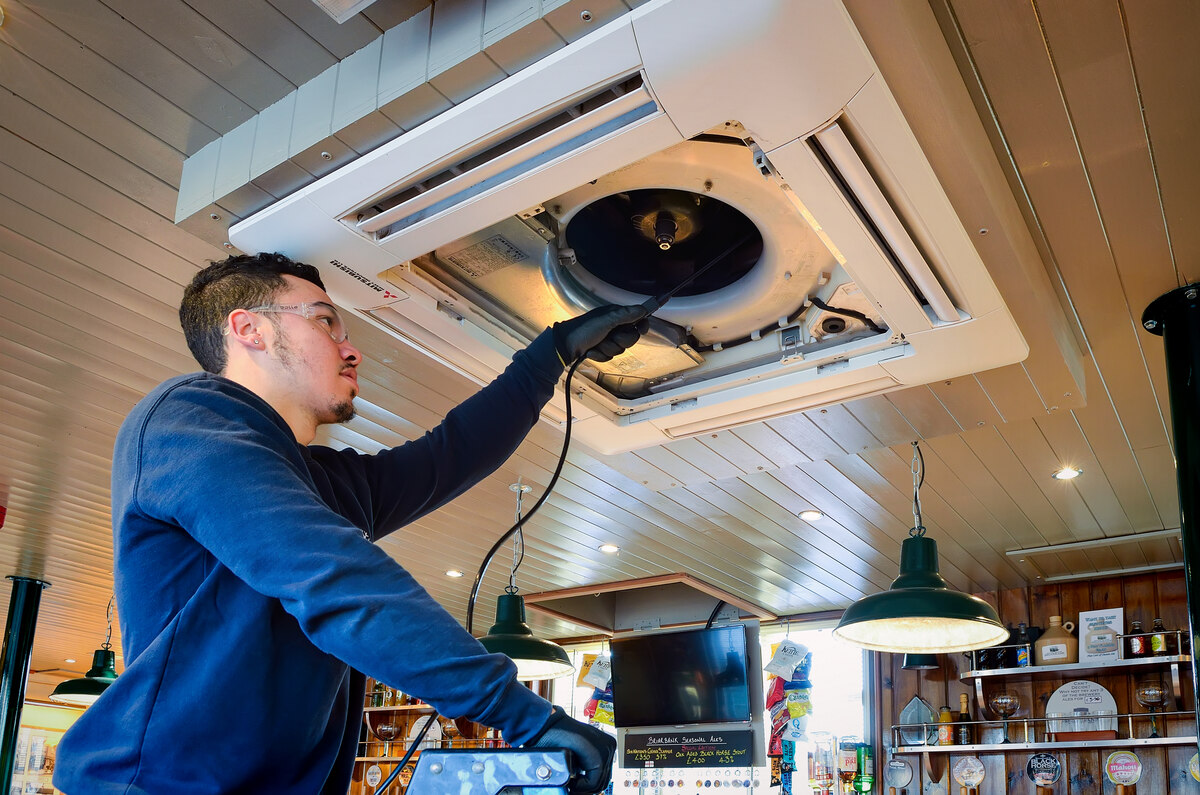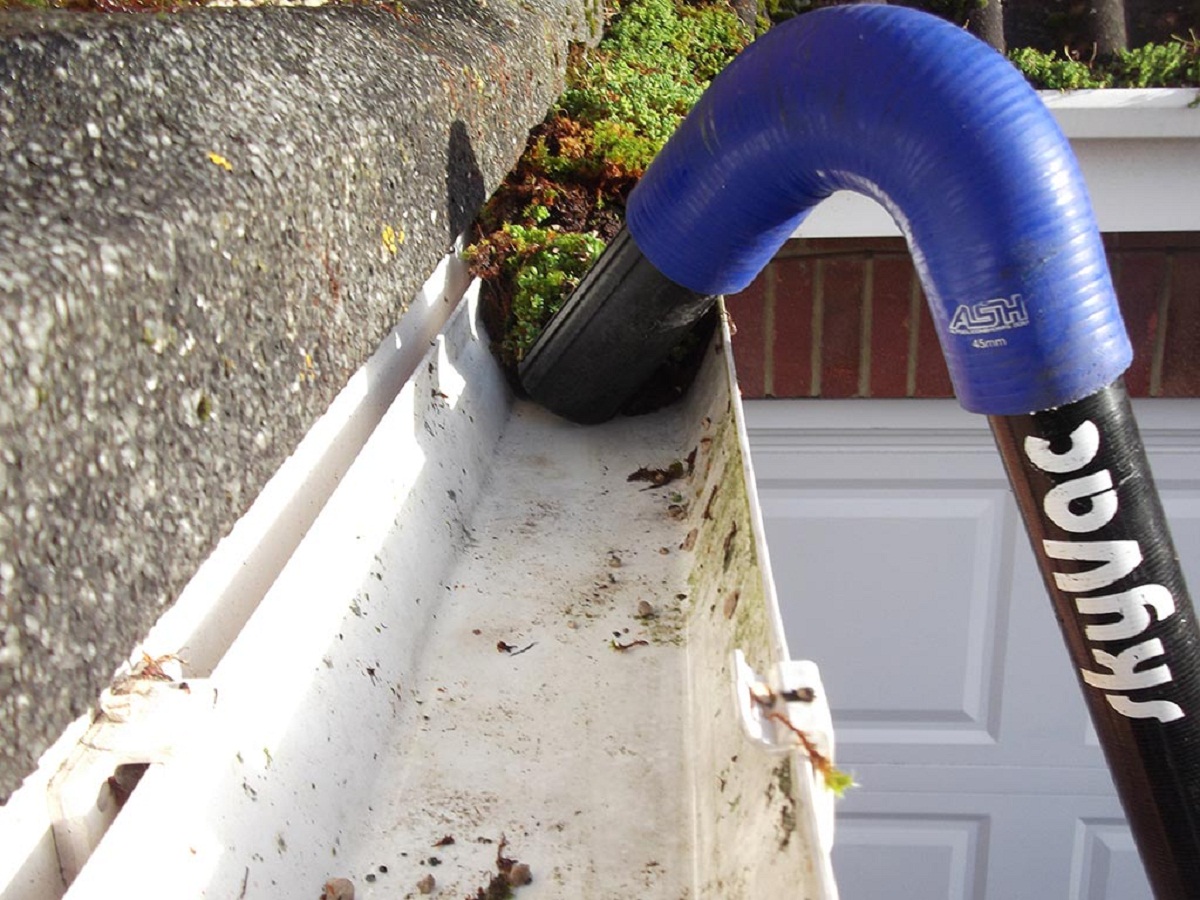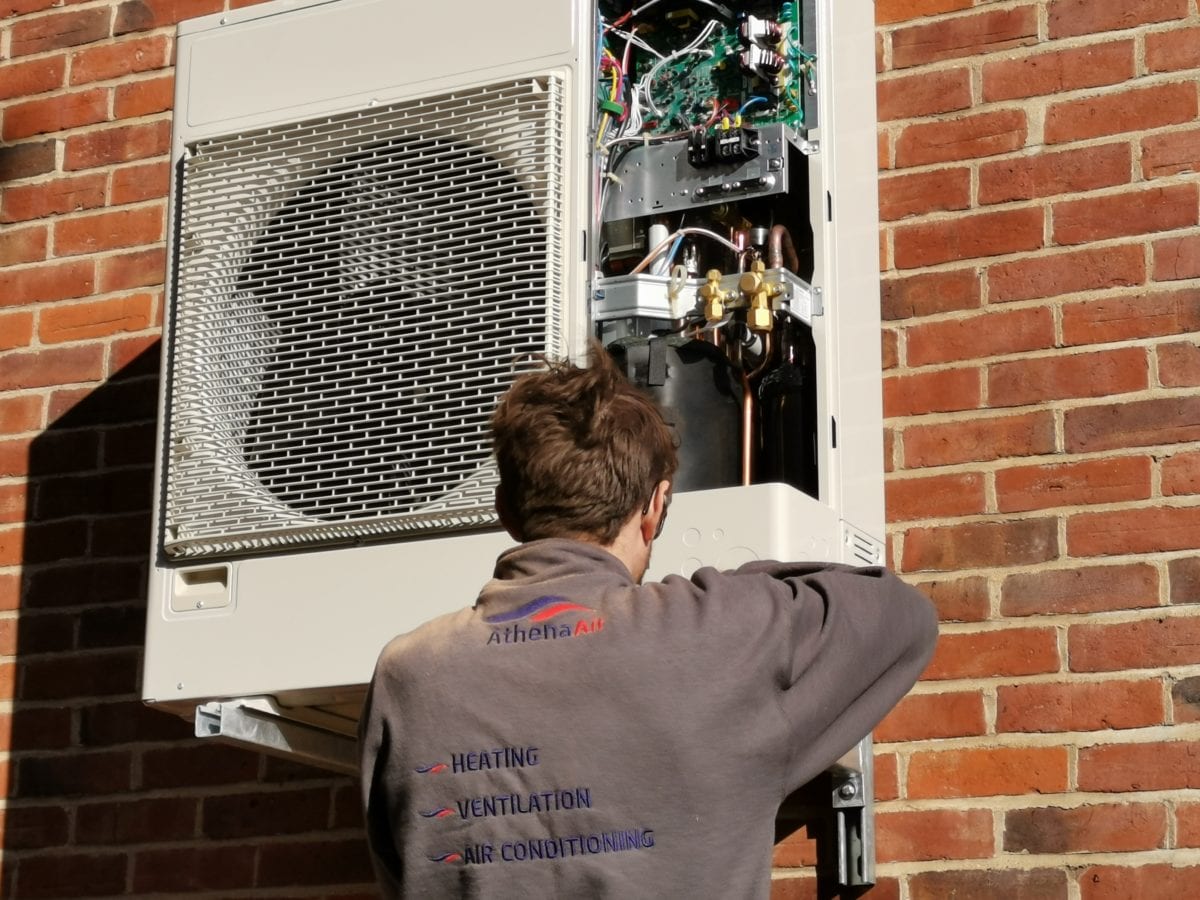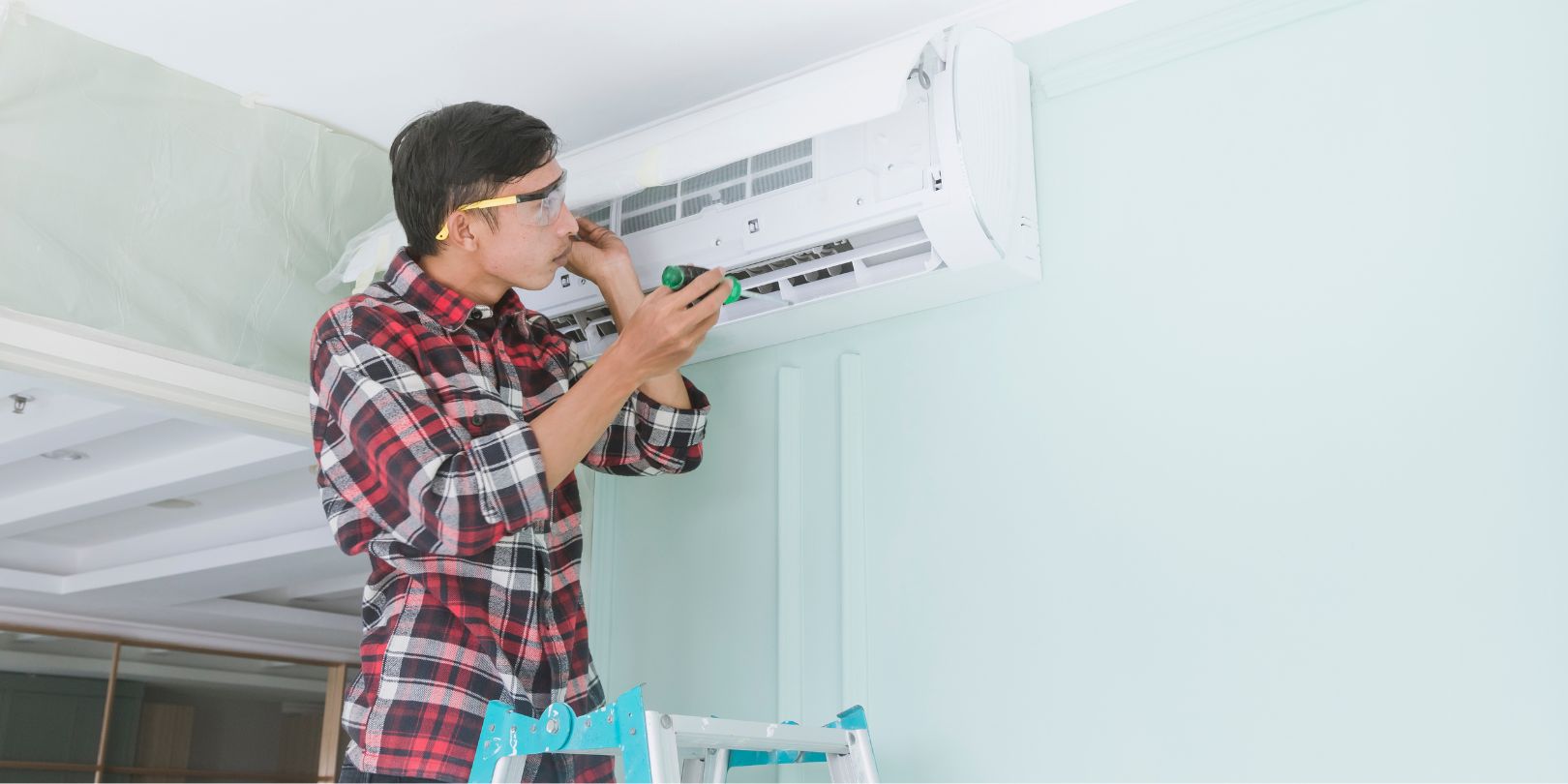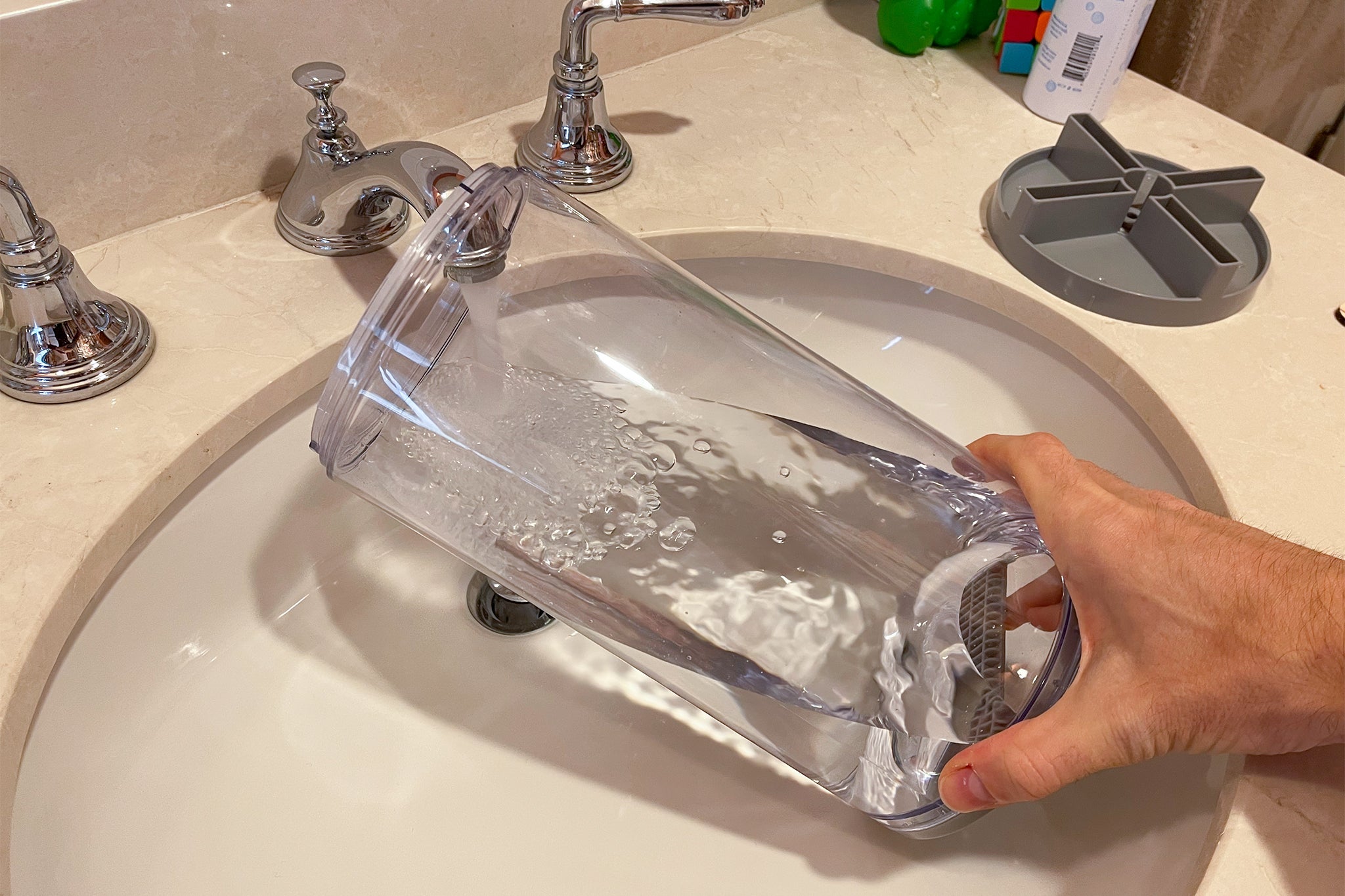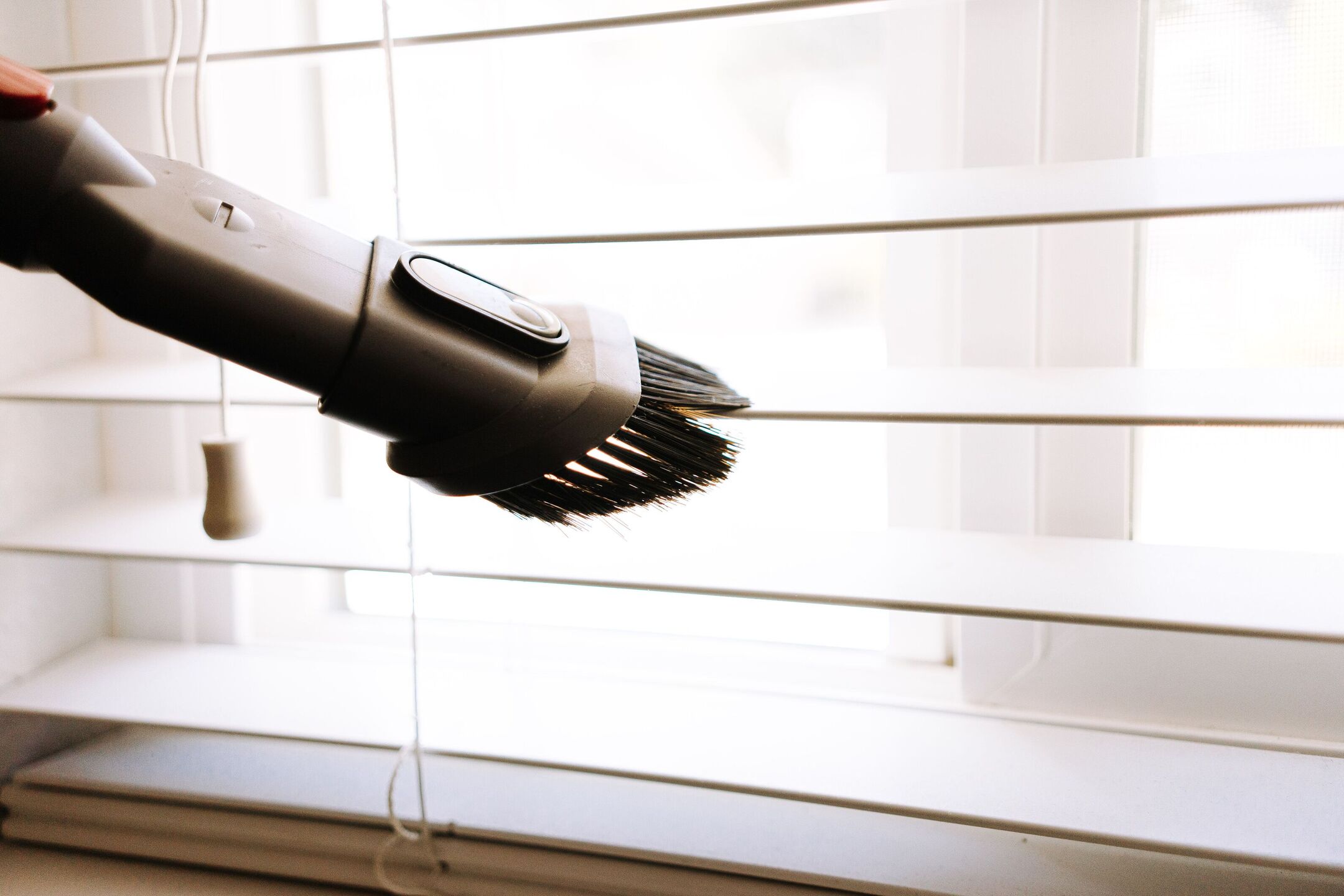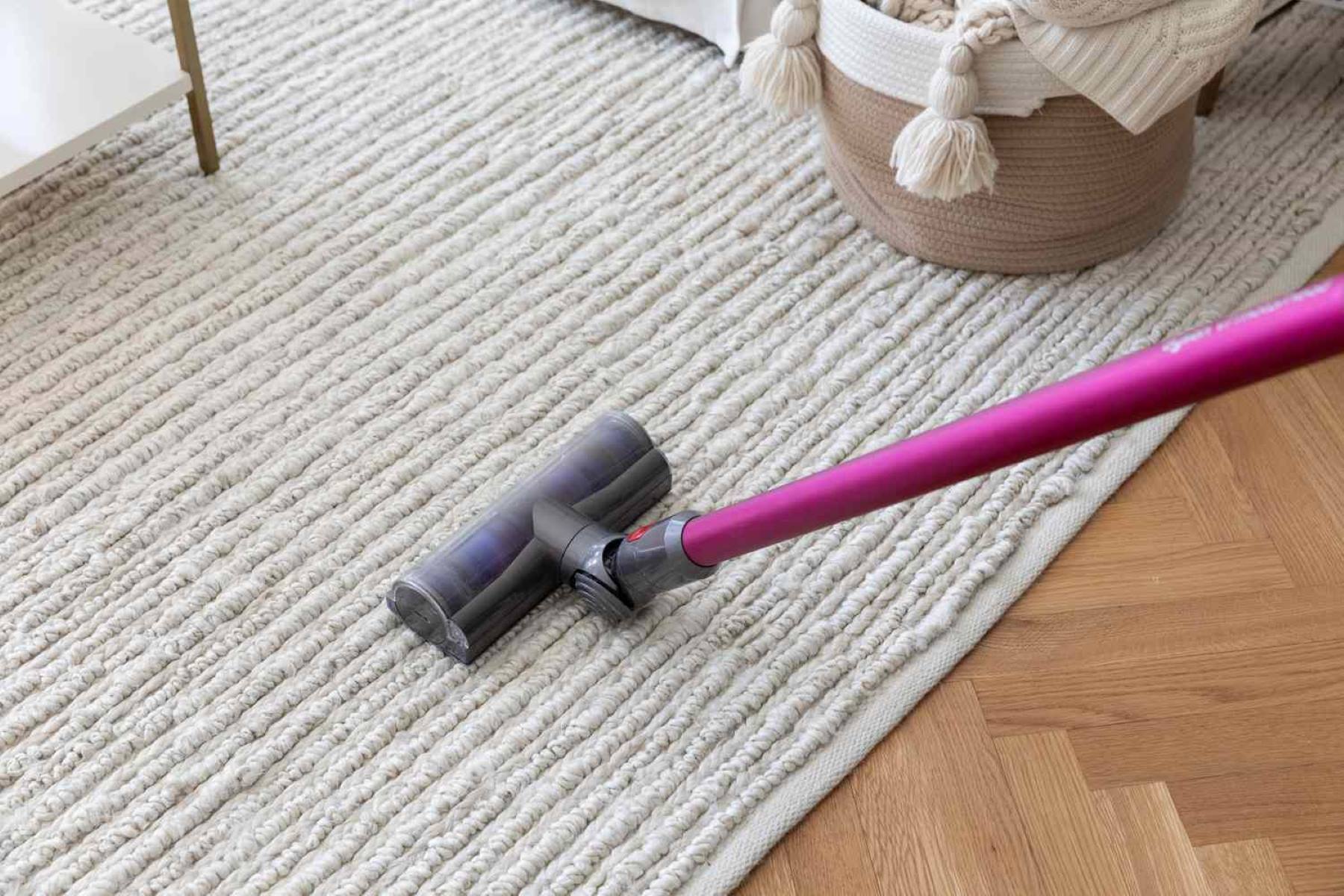Home>Home Maintenance>How Often Should You Get Your Air Conditioner Serviced
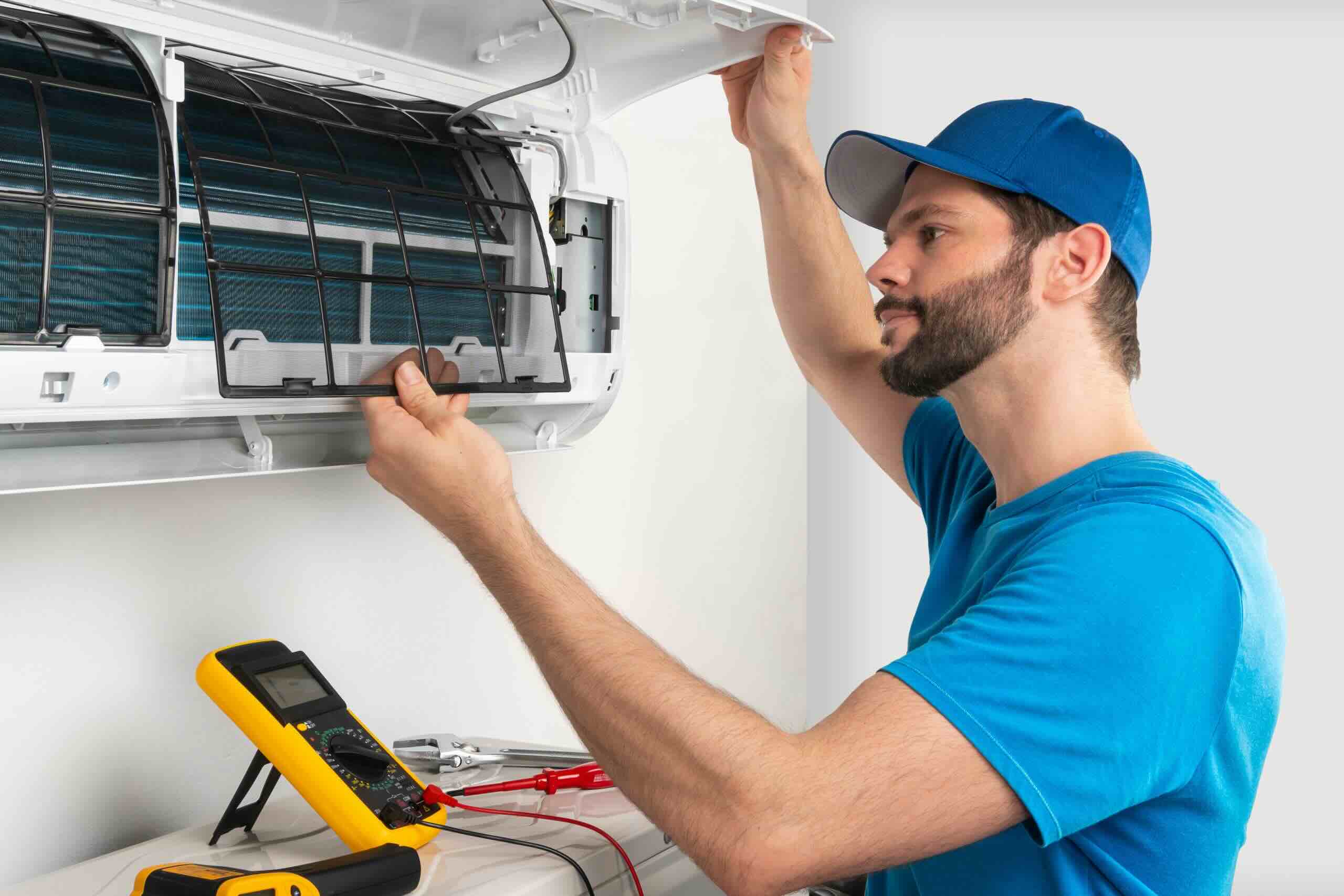

Home Maintenance
How Often Should You Get Your Air Conditioner Serviced
Modified: March 7, 2024
Regular air conditioner servicing is crucial for maintaining a comfortable home environment. Discover how often you should schedule professional maintenance to ensure optimal performance and energy efficiency.
(Many of the links in this article redirect to a specific reviewed product. Your purchase of these products through affiliate links helps to generate commission for Storables.com, at no extra cost. Learn more)
Introduction
Welcome to our comprehensive guide on air conditioner servicing! As a homeowner, it’s crucial to understand the importance of regular maintenance for your air conditioner. With proper servicing, you can ensure that your AC system functions efficiently, lasts longer, and provides optimal cooling throughout the year.
An air conditioner is a significant investment, and it plays a vital role in keeping your home comfortable, especially during hot summer months. Regular servicing not only helps in maintaining the performance of your air conditioner but also improves indoor air quality and reduces energy consumption.
In this article, we will explore the benefits of regular air conditioner servicing, factors that affect the frequency of servicing, signs that indicate your AC needs attention, DIY maintenance tips, common issues that require professional servicing, and the importance of hiring a qualified technician. Let’s dive in!
Key Takeaways:
- Regular air conditioner servicing is crucial for improved efficiency, extended lifespan, and cost savings. It also ensures better indoor air quality and consistent comfort throughout your home.
- Hiring a professional for air conditioner servicing is essential to prevent costly mistakes, ensure safety, and enjoy long-term savings. Their expertise and specialized tools contribute to optimal performance and peace of mind.
Benefits of Regular Air Conditioner Servicing
Regular air conditioner servicing offers numerous benefits that have a direct impact on the performance and longevity of your AC unit. Let’s take a closer look at some of the key advantages:
- Improved Energy Efficiency: A well-maintained air conditioner operates more efficiently, resulting in lower energy consumption. Regular servicing includes cleaning or replacing air filters, lubricating moving parts, and checking refrigerant levels, all of which contribute to improved energy efficiency.
- Increased Lifespan: By investing in regular servicing, you can extend the lifespan of your air conditioner. The technician will inspect and address any potential issues before they escalate, preventing major breakdowns that could lead to costly repairs or even premature replacement.
- Enhanced Cooling Performance: Over time, dust and debris can accumulate on the evaporator coils and air filters, hindering the airflow and reducing the cooling efficiency. Servicing involves deep cleaning of these components, ensuring optimal cooling performance and maintaining consistent indoor comfort.
- Better Air Quality: The air filters in your air conditioner play a crucial role in removing dust, pollen, pet dander, and other pollutants from the air. Regular servicing includes cleaning or replacing these filters, promoting cleaner and healthier indoor air quality, which is especially important for individuals with allergies or respiratory issues.
- Prevention of Costly Repairs: During routine servicing, the technician can detect and address minor issues before they escalate into major problems. This proactive approach helps prevent costly repairs down the line, saving you both time and money.
- Reduced Carbon Footprint: An efficiently running air conditioner not only saves energy but also reduces your carbon footprint. By reducing energy consumption, you contribute to a healthier environment by minimizing greenhouse gas emissions.
- Consistent Comfort: One of the primary reasons for having an air conditioner is to stay comfortable indoors. Regular servicing ensures that your AC unit maintains its cooling capacity and can provide consistent and reliable comfort throughout the year.
Overall, regular air conditioner servicing has numerous benefits, ranging from improved energy efficiency and extended lifespan to better air quality and reduced repair costs. By investing in maintenance, you can enjoy the optimal performance of your AC unit while saving money and contributing to a greener environment.
Factors That Affect the Frequency of Air Conditioner Servicing
The frequency at which you should service your air conditioner can vary depending on several factors. It’s important to consider these factors to ensure that your AC unit receives the appropriate maintenance. Here are some key factors that can affect the frequency of air conditioner servicing:
- Manufacturer’s Recommendations: The manufacturer of your air conditioner typically provides guidelines on the recommended servicing frequency. These guidelines are based on the specific model and components of your AC unit and should be followed as a baseline for maintenance.
- Usage Patterns: The frequency of servicing can be influenced by how often you use your air conditioner and for how long. If your AC unit is running continuously or used year-round, it may require more frequent servicing compared to units that are used seasonally.
- Environmental Conditions: The local climate and environmental conditions can also impact how often your air conditioner needs servicing. For instance, if you live in an area with high humidity or excessive dust, it can result in faster accumulation of debris, causing your AC unit to require more frequent cleaning and maintenance.
- Indoor Air Quality: If the indoor air quality in your home is poor, it can affect the cleanliness and efficiency of your air conditioner. Factors such as the presence of pets, smoking, or exposure to construction dust can contribute to faster build-up of dirt and pollutants, requiring more frequent servicing.
- Age of the AC Unit: Older air conditioner units may require more frequent servicing compared to newer models. As an AC unit ages, its components may deteriorate, and potential issues can arise more frequently, necessitating regular inspections and maintenance to keep it running smoothly.
- Previous Servicing History: If your air conditioner has been well-maintained in the past and has a good servicing history, it may require less frequent servicing. However, if servicing has been neglected or irregular, the AC unit may need more attention to address any accumulated problems.
It’s important to note that these factors are general guidelines, and it’s always best to consult with a qualified HVAC technician to determine the ideal frequency of servicing for your specific air conditioner. A professional technician can assess the condition of your AC unit, consider these factors, and provide personalized recommendations for servicing intervals.
By understanding these factors and staying proactive in maintaining your air conditioner, you can ensure that it receives the necessary care and attention to perform optimally and provide you with the comfort you desire. Regular servicing helps in preventing major issues, extending the lifespan of your AC unit, and ensuring energy efficiency.
Recommended Frequency for Air Conditioner Servicing
The recommended frequency for servicing your air conditioner can vary based on several factors, including manufacturer’s recommendations, usage patterns, climate conditions, and the age of the unit. While there is no one-size-fits-all answer, here are some general guidelines to help you determine the ideal frequency for servicing your AC unit:
- Annual Servicing: At the very least, it is recommended to have your air conditioner serviced once a year. Annual servicing allows for a thorough inspection, cleaning, and maintenance of your AC unit, ensuring optimal performance and longevity. This should be considered as a minimum requirement for all air conditioners.
- Seasonal Servicing: For areas with harsher climates or if you heavily rely on your air conditioner, it may be beneficial to have your AC unit serviced twice a year. This can include a pre-season check-up before the summer months and a post-season maintenance to address any issues that may have arisen during the heavy usage period.
- Occasional Check-ups: In addition to annual or seasonal servicing, it’s a good practice to perform occasional check-ups on your air conditioner. This can involve inspecting the filters, cleaning dust and debris from the exterior unit, and ensuring that the system is running smoothly. These quick inspections can help catch any early warning signs of problems and prevent major breakdowns.
- Individual Needs: It’s important to consider your specific needs and circumstances. If you have allergies, respiratory issues, or live in an area with high pollution, more frequent servicing may be necessary to maintain good indoor air quality. Additionally, if you have an older AC unit or a complex system, it may require more frequent professional inspections and maintenance.
Remember, these are general recommendations, and it’s always best to consult with a professional HVAC technician who can evaluate your specific air conditioning system and provide personalized advice on the ideal frequency of servicing. They will take into account various factors such as your usage patterns, environmental conditions, and the specific requirements of your AC unit.
By adhering to the recommended servicing frequency, you can ensure that your air conditioner operates efficiently, lasts longer, and provides you with optimal cooling comfort. Regular maintenance not only saves you money in the long run by preventing major repairs, but it also helps maintain good indoor air quality and reduces energy consumption. So, don’t forget to schedule regular servicing for your air conditioner to enjoy its optimal performance year after year.
Signs That Your Air Conditioner Needs Servicing
Knowing the signs that your air conditioner needs servicing is essential to prevent major breakdowns and ensure optimal performance. Here are some common signs that indicate your AC unit may require attention:
- Poor Airflow: If you notice weak or limited airflow from your air conditioner vents, it may be a sign of a clogged or dirty air filter, blocked ductwork, or a malfunctioning blower fan. Reduced airflow can result in inefficient cooling and decreased comfort.
- Uneven Cooling: If some areas of your home feel significantly warmer or cooler than others, it may indicate an issue with your air conditioner. This can be caused by problems with the thermostat, ductwork, or even an imbalance in the refrigerant levels. A professional inspection can help identify and rectify these issues.
- Increased Energy Bills: If you notice a sudden spike in your energy bills without a corresponding increase in usage, it may indicate that your air conditioner is not running efficiently. A malfunctioning component or improper maintenance can cause your AC unit to work harder and consume more energy.
- Strange Noises: Unusual sounds such as grinding, squealing, or banging coming from your air conditioner are clear signs of a problem. It could be due to worn-out parts, loose components, or a malfunctioning motor. Ignoring these noises can lead to more significant damage if not addressed promptly.
- Unpleasant Odors: Foul or musty odors coming from the air vents when your AC is running can indicate a buildup of mold or mildew. These odors not only affect the indoor air quality but also indicate potential moisture and cleanliness issues within the unit that should be addressed.
- Frequent Cycling: If your air conditioner turns on and off more frequently than usual, it may indicate a problem with the thermostat, refrigerant levels, or even a faulty compressor. Excessive cycling can put strain on the system and impact its efficiency.
- Water Leaks: If you notice water pooling around your air conditioner or dripping from the indoor unit, it may be a sign of a clogged drain pipe or a malfunctioning condensate pump. Ignoring the issue can lead to water damage and potential mold growth.
- Visible Damage: Any visual damage to your air conditioner, such as bent or damaged fins, loose or disconnected parts, or signs of rust or corrosion, should not be ignored. These issues can affect the performance and lifespan of your AC unit.
If you notice any of these signs, it’s important to schedule a professional inspection and servicing of your air conditioner. A qualified HVAC technician can diagnose the problem, determine the necessary repairs or maintenance, and ensure that your AC unit is running efficiently and providing optimal cooling comfort.
Remember, addressing issues early can prevent more extensive damage and save you from costly repairs or replacements. Regular servicing and prompt attention to these signs will help keep your air conditioner in top-notch condition and ensure a comfortable indoor environment.
It is recommended to have your air conditioner serviced at least once a year to ensure it is running efficiently and to catch any potential issues early on. Regular maintenance can help extend the lifespan of your unit and prevent costly repairs.
Read more: How Often Should You Service Your AC
DIY Maintenance Tips to Keep Your Air Conditioner Running Efficiently
Maintaining your air conditioner regularly is essential to ensure optimal performance and longevity. While professional servicing is necessary, there are also several DIY maintenance steps you can take to keep your AC unit running efficiently. Here are some tips:
- Regularly Clean or Replace Air Filters: Dirty air filters restrict airflow and reduce the efficiency of your air conditioner. Check your filters monthly and clean or replace them as needed. This will improve airflow, indoor air quality, and overall cooling performance.
- Clean the Condenser and Evaporator Coils: Over time, dust and debris can accumulate on the condenser and evaporator coils, reducing the cooling capacity of your AC unit. Use a soft brush or a vacuum cleaner to gently clean these coils at least once a year to maintain their efficiency.
- Clear Debris from the Outdoor Unit: Regularly remove leaves, dirt, and other debris from the outdoor condenser unit. Ensure that airflow around the unit is unrestricted, as blocked vents can lead to reduced efficiency and potential damage to the unit.
- Keep the Surrounding Area Clean: Trim back any plants, bushes, or vegetation near the outdoor unit to allow proper airflow. Additionally, keep the area around the unit free from dust and debris to prevent it from being drawn into the system.
- Check and Clean the Condensate Drain Line: The condensate drain line removes moisture from your air conditioner. Periodically check the drain line for clogs and remove any blockages. You can use a mixture of bleach and water to clean the drain line and prevent the growth of mold or algae.
- Inspect and Seal Ductwork: Leaky ducts can lead to energy waste and reduced cooling efficiency. Inspect the ductwork regularly for any visible leaks and seal them with duct tape or mastic sealant to improve cooling efficiency and airflow.
- Adjust the Thermostat: Optimize your energy usage by adjusting the thermostat settings when you are away from home or during sleeping hours. Programmable or smart thermostats can help you save energy and maintain a comfortable indoor temperature.
- Ensure Proper Insulation: Proper insulation in your home helps in maintaining a consistent indoor temperature and reduces the workload on your air conditioner. Insulate the attic, walls, and windows to prevent heat transfer and improve energy efficiency.
- Practice Regular Maintenance: Create a maintenance schedule for your air conditioner and follow it diligently. This includes tasks like checking refrigerant levels, lubricating moving parts, and inspecting electrical connections. Refer to your AC unit’s manual for specific maintenance guidelines.
While these DIY maintenance tips can help keep your air conditioner running efficiently, it’s important to remember that professional servicing is still necessary. A qualified HVAC technician can perform comprehensive inspections, identify potential issues, and perform specialized maintenance tasks that cannot be easily done at home.
By combining regular DIY maintenance with professional servicing, you can ensure that your air conditioner operates optimally, lowers energy costs, and provides you with cool and comfortable indoor air all summer long.
Common Issues That Require Professional Air Conditioner Servicing
While regular maintenance and DIY measures can help keep your air conditioner in good condition, there are certain issues that require the expertise of a professional HVAC technician. Prompt professional servicing is essential to address these problems and ensure the optimal performance of your AC unit. Here are some common issues that necessitate professional air conditioner servicing:
- Refrigerant Leaks: If you notice a decrease in cooling capacity or ice buildup on your air conditioner, it may indicate a refrigerant leak. Handling refrigerant requires specialized knowledge and equipment, so it’s crucial to have a professional technician identify and repair the leak and recharge the refrigerant to restore optimal cooling performance.
- Faulty Compressor: The compressor is a vital component of your air conditioner that circulates refrigerant and enables heat transfer. If you hear unusual noises, experience frequent cycling, or notice warm air coming from the vents, it may be a sign of a faulty compressor. Replacement or repair of the compressor should be performed by a trained technician.
- Frozen Evaporator Coil: A frozen evaporator coil can result from restricted airflow, low refrigerant levels, or issues with the blower fan. It can cause your air conditioner to operate inefficiently or shut down altogether. A professional technician can diagnose the underlying cause, address the issue, and prevent future occurrences.
- Electrical Malfunctions: Issues with electrical components, such as faulty wiring, malfunctioning relays, or capacitor problems, can disrupt the functioning of your air conditioner. Electrical repairs should always be left in the hands of a qualified professional to ensure safety and proper resolution of the problem.
- Thermostat Problems: A malfunctioning thermostat can result in inaccurate temperature readings or improper cooling cycles. An HVAC technician can calibrate or replace the thermostat to ensure accurate temperature control and optimal energy efficiency.
- Ductwork Issues: Leaky or damaged ducts can lead to energy waste, reduced airflow, and uneven cooling. Professional technicians can inspect the ductwork, detect any leaks, and seal or repair them to restore the efficiency of your air conditioner and improve indoor comfort.
- Blower Fan Problems: A malfunctioning blower fan can lead to poor airflow, reduced cooling performance, and increased energy consumption. Technicians have the expertise to diagnose and repair issues related to the blower fan motor, belt, or other components.
- Strange Smells or Odors: Unpleasant odors coming from your air conditioner can indicate mold or mildew growth or potential burning of electrical components. A professional technician can identify the source of the odor, clean the system, and ensure that your indoor air quality is not compromised.
It’s important to remember that attempting DIY repairs for these complex issues can be dangerous and may cause further damage to your air conditioner. Professional air conditioner servicing is necessary to diagnose the problem accurately, perform the appropriate repairs, and ensure the safe and efficient operation of your AC unit.
If you encounter any of these common issues or notice any other abnormalities with your air conditioner, contact a trusted HVAC technician to schedule a service call. Timely professional servicing will help keep your air conditioner performing optimally, extend its lifespan, and provide you with reliable cooling comfort.
Importance of Hiring a Professional for Air Conditioner Servicing
When it comes to air conditioner servicing, it’s crucial to rely on the expertise of a professional HVAC technician. While there are certain maintenance tasks you can do yourself, many aspects of air conditioner maintenance require specialized knowledge, skills, and equipment. Here are some key reasons why hiring a professional for air conditioner servicing is important:
- Experience and Expertise: HVAC technicians undergo extensive training and have the necessary experience to handle a wide range of air conditioner issues. They are equipped with the knowledge to diagnose problems accurately, recommend appropriate solutions, and perform repairs and maintenance tasks effectively.
- Improved Safety: Working with air conditioning systems involves handling electrical components, refrigerants, and various moving parts. Professionals are trained to adhere to safety protocols and prevent accidents or mishaps during servicing. They understand the potential risks associated with the job and take the necessary precautions to ensure everyone’s safety.
- Prevention of Costly Mistakes: DIY attempts at air conditioner maintenance can often lead to costly mistakes. A professional technician knows the intricacies of the system, understands its components, and can avoid errors that may cause further damage. By hiring a professional, you can prevent potential expensive repairs that could have been avoided.
- Proper Tools and Equipment: HVAC technicians have access to specialized tools and equipment designed for air conditioner servicing. These tools allow them to carry out repairs, clean components effectively, measure refrigerant levels accurately, and perform other tasks with precision. Using the right tools ensures that the job is done correctly and efficiently.
- Comprehensive Servicing: A professional technician can provide comprehensive servicing for your air conditioner. They will inspect critical components, clean or replace filters, check refrigerant levels, lubricate moving parts, ensure proper airflow, and perform any necessary repairs. This thorough approach helps optimize the performance and energy efficiency of your AC unit.
- Warranty Protection: Many air conditioner manufacturers require professional servicing to maintain warranty coverage. Hiring a qualified technician for regular maintenance ensures that you comply with the warranty terms and conditions, protecting your investment and giving you peace of mind.
- Long-Term Savings: Professional servicing can help identify and address minor issues early on, preventing them from escalating into major problems that require costly repairs or even complete system replacement. Regular maintenance also improves energy efficiency, resulting in lower utility bills over time.
Ultimately, hiring a professional for air conditioner servicing is essential to ensure the longevity, efficiency, and reliable performance of your AC unit. By entrusting this task to a trained technician, you can enjoy optimal cooling comfort, improved indoor air quality, and the peace of mind that your air conditioner is in capable hands.
When selecting an HVAC technician, look for a reputable company with proper licensing and certifications. Read customer reviews, ask for recommendations, and choose someone who has a proven track record of providing high-quality air conditioner servicing. Regular professional maintenance will keep your air conditioner running smoothly and provide you with comfort throughout the year.
Conclusion
Regular air conditioner servicing is vital to ensure the optimal performance, efficiency, and longevity of your AC unit. By adhering to a proper maintenance routine and seeking professional help when needed, you can enjoy cool and comfortable indoor temperatures while maximizing energy savings. Here’s a summary of what we’ve covered:
We discussed the benefits of regular air conditioner servicing, including improved energy efficiency, extended lifespan, enhanced cooling performance, and better indoor air quality. Servicing your air conditioner also helps prevent costly repairs, reduces your carbon footprint, and ensures consistent comfort throughout your home.
We explored the factors that affect the frequency of air conditioner servicing, such as manufacturer’s recommendations, usage patterns, environmental conditions, indoor air quality, and the age of the unit. Understanding these factors will help you determine the appropriate servicing interval for your specific air conditioner.
Knowing the signs that your air conditioner needs servicing is essential for prompt action. Poor airflow, uneven cooling, increased energy bills, strange noises, unpleasant odors, frequent cycling, water leaks, or visible damage are all indicators that professional attention is required to address the issues and restore optimal functionality.
We also provided DIY maintenance tips that you can follow to keep your air conditioner running efficiently. Cleaning or replacing air filters, clearing debris from the outdoor unit, checking and cleaning condenser coils, and inspecting and sealing ductwork are among the tasks you can perform regularly to maintain your AC unit.
However, certain common issues, such as refrigerant leaks, faulty compressors, frozen evaporator coils, electrical malfunctions, thermostat problems, ductwork issues, and blower fan problems, require the expertise of a professional HVAC technician. Professional servicing ensures accurate diagnosis, appropriate repairs, and enhanced safety.
In conclusion, hiring a professional for air conditioner servicing is crucial for a thorough inspection, maintenance, and repair of your AC unit. Professionals have the experience, knowledge, and specialized tools to handle complex tasks, improve safety, and prevent costly mistakes. Their services contribute to long-term savings, warranty protection, and the peace of mind that your air conditioner is operating at its best.
So, make a commitment to regular air conditioner servicing and prioritize the comfort, efficiency, and durability of your AC unit. By doing so, you can enjoy cool and refreshing indoor air for years to come.
Frequently Asked Questions about How Often Should You Get Your Air Conditioner Serviced
Was this page helpful?
At Storables.com, we guarantee accurate and reliable information. Our content, validated by Expert Board Contributors, is crafted following stringent Editorial Policies. We're committed to providing you with well-researched, expert-backed insights for all your informational needs.
